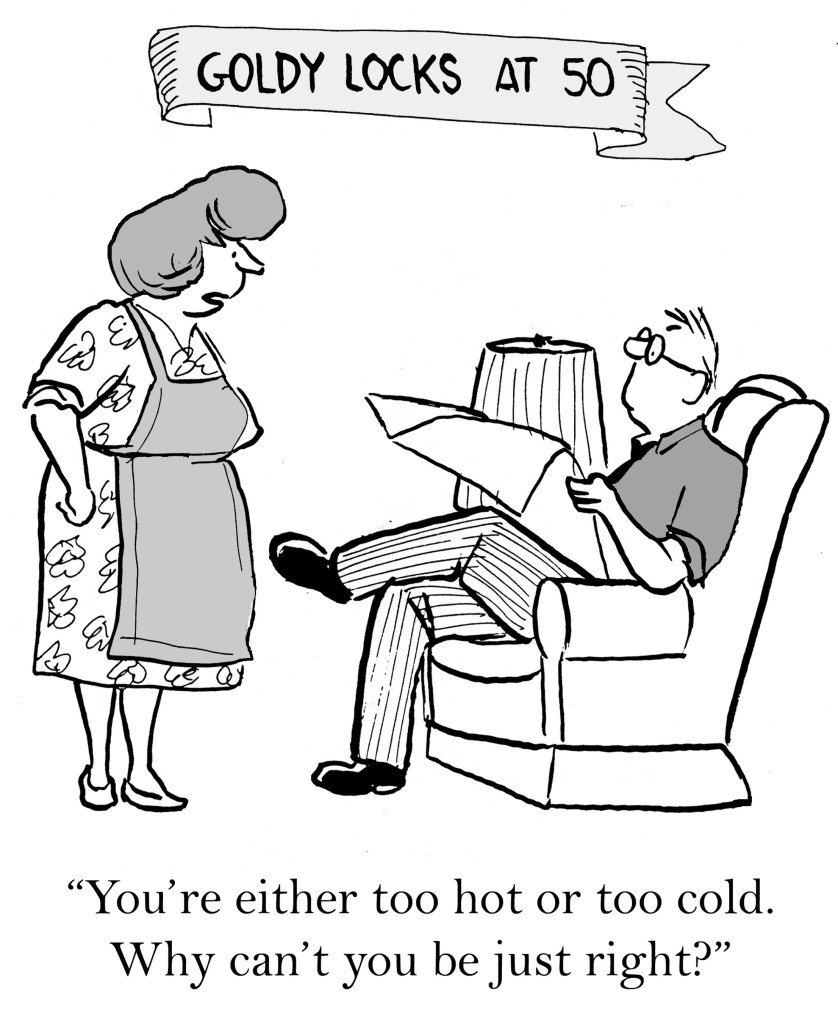
When does it happen?
Menopause symptoms occur at the end of the body’s menstrual cycles, usually when women reach their 40s or 50s; perimenopause begins a few years before menopause. Some women may experience menopause as late as their 60s. The average age in the US is 51 and the most common reason is the natural biological decline of reproductive hormones. Menopausal age varies and procedures such as chemotherapy and/or radiation, hysterectomy, or primary ovarian insufficiency can lead to early menopause.
Perimenopause Symptoms
Experiencing the following, additionally to irregular periods, alerts you that your body is in perimenopause:
- Vaginal dryness and irritation
- Hot flashes and chills
- Night sweats
- Problems sleeping
- Mood changes
- Slowed metabolism and weight gain
- Thinning hair and dry skin
- Loss of breast fullness
- Thin bones
Period irregularity does not guarantee you are in menopause, so until you are sure do not stop using contraceptive methods. Your ovaries are still producing eggs, even though your hormone levels are changing.
Menopause
Leading up to menopause, you will experience changes in menstruation, with period irregularity that includes either heavier periods or periods that skip for a month or more than return regularly for a few months. Once you have gone 12 months without menstruating, your body has gone into menopause.
Treatment
There are different types of treatment available to ease menopausal symptoms.
Menopause hormone therapy (MHT) is one of the most common treatments, though it is not safe for all women. You should always consult your healthcare provider, and avoid MHT if:
- You think you are pregnant
- You have had certain types of cancer, blood clots, a stroke or heart attack
- You have liver disease or problems with vaginal bleeding
Non-hormone treatments approved by the FDA are also an option, especially when it comes to easing the symptoms of severe hot flashes and pain with sexual activity (dyspareunia).
Natural methods such as dietary supplements or over-the-counter natural hormone creams may be used to alleviate some menopausal symptoms.
Every treatment method has advantages and disadvantages, and there is no one-fits-all solution to dealing with menopause. Always consult your healthcare provider before pursuing treatment and be knowledgeable about potential risks.
After Menopause
Some of the symptoms may continue after menopause, such as vaginal dryness and changes in sex drive; seek methods that will help you protect your heart and prevent bone loss. Postmenopausal vaginal bleeding should not occur, and if it does it may be a sign of a medical issue that requires urgent attention.
More
 Menopause. The change. An uncertain time in a woman’s life when her body makes permanent, and unfamiliar changes. For the millions of women who go through menopause each year, the symptoms of this altering state can feel overwhelming, leading many women to dread the day that they realize menopause has arrived. If you are experiencing menopause now, or are anticipating the day when the first signs or symptoms appear, familiarize yourself with our tips for easing the symptoms of menopause so that when the change does occur, you can face it confidently and without distress.
Menopause. The change. An uncertain time in a woman’s life when her body makes permanent, and unfamiliar changes. For the millions of women who go through menopause each year, the symptoms of this altering state can feel overwhelming, leading many women to dread the day that they realize menopause has arrived. If you are experiencing menopause now, or are anticipating the day when the first signs or symptoms appear, familiarize yourself with our tips for easing the symptoms of menopause so that when the change does occur, you can face it confidently and without distress.
Symptoms of Menopause
The symptoms that women experience during menopause — while varied — are primarily caused by a single factor: hormone changes. While every woman’s experiences will be different, what follows is a list of the most common symptoms that women experience during menopause:
• Hot flashes — a sensation of heat all over the upper body and/or flushing of the face and neck.
• Vaginal dryness, which can lead to discomfort during sex.
• Irregular periods that come more or less frequently than experienced previously.
• Periods that last for more or fewer days than experienced previously.
• Periods that are noticeably heavier or lighter than experienced previously.
• Night sweats.
• Difficulty sleeping.
• Mood swings—crying more frequently, seemingly without reason.
• Urinary tract infections.
• Urinary incontinence.
• Disinterest in sex, or feeling more comfortable about sex.
• Forgetfulness/difficulty focusing.
• Feeling stiff or achy.
Easing the Symptoms of Menopause
If you are experiencing any of these symptoms, know that you don’t have to suffer. Much of the discomfort associated with this phase of life can be treated with simple lifestyle changes and at-home remedies. Follow these tips to help ease your symptoms.
To Treat Hot Flashes:
- Avoid triggers such as spicy foods, alcohol, stress, caffeine, and hot locations.
- Dress in layers.
- Make sure you have a fan conveniently located in your home or workplace.
- When you feel a hot flash coming on, take deep, slow breaths.
To Treat Vaginal Dryness:
- To ease discomfort during sex, use a water-based, over-the-counter vaginal lubricant.
- To assist general feelings of dryness, use an over-the-counter vaginal moisturizer.
To Treat Sleep-Related Issues:
- Remaining active during the day will help you feel restful at night. Do not exercise too close to bedtime however, as such physical activity may make you feel awake immediately following.
- Avoid large meals directly before bed, and do not consume caffeine after noon.
- Do not smoke directly before bed.
- Keep your bedroom cool.
- Avoid naps during the day.
- Try to wake up and go to bed at the same time every day.
To Treat Mood Swings:
- Stay active during the day, and try to get regular sleep at night.
- Work to manage the stress factors in your life.
- Talk to your doctor to determine if you are experiencing depression and could benefit from more focused depression treatment.
To Treat Memory Problems:
- Stay active during the day, and try to get regular sleep during the night.
- To Treat Urinary Incontinence:
- Talk to your OBGYN. There may be medicines, behavioral changes, or devices that may ease your symptoms.
Hormone Therapy:
- Menopausal hormone therapy (MHT) can be an effective treatment for several of the symptoms of menopause, including vaginal dryness, mood swings, hot flashes, and night sweats.
- Low-dose oral contraceptives may help to ease symptoms if you are still receiving your period.
Feeling overwhelmed? Don’t feel like menopause is beyond your control. Start by talking to your OBGYN. He/she can help you to address your specific symptoms and devise a treatment plan that will suit your needs and ease your discomfort.
More
 Of all of life’s changes that impact a woman’s body, none may be as unpredictable as menopause. During both perimenopause, the time period shortly before menopause, and menopause, a woman’s estrogen levels fluctuate as her ovaries try to accommodate changing levels of hormone production. As a result, women may experience such uncomfortable symptoms as mood swings, depression, hot flashes, breast pain, and sleeplessness. If you are going through the phases of menopause, you don’t have to suffer. Follow these nine tips to help manage your symptoms and ease through the stages of life’s most unpredictable change.
Of all of life’s changes that impact a woman’s body, none may be as unpredictable as menopause. During both perimenopause, the time period shortly before menopause, and menopause, a woman’s estrogen levels fluctuate as her ovaries try to accommodate changing levels of hormone production. As a result, women may experience such uncomfortable symptoms as mood swings, depression, hot flashes, breast pain, and sleeplessness. If you are going through the phases of menopause, you don’t have to suffer. Follow these nine tips to help manage your symptoms and ease through the stages of life’s most unpredictable change.
- Exercise regularly. Exercising at least 20 minutes three times a week can help to ease hot flashes by lowering the amount of circulating follicle stimulating hormone (FSH) and luteinizing hormone (LH) in your body.
- Reclaim your balance with yoga. Many women report that one of the most frustrating side effects of menopause is an increased feeling of stress and agitation. Meditation and yoga are two calming practices that can help women to feel more relaxed and comfortable during menopause, improving their mood and positively affecting their endocrine system.
- Protect your body from bone loss. During menopause, women should increase the amount of both calcium and vitamin C in their diet to help limit bone loss, another commonly occurring side effect of changing levels of estrogen.
- Consider acupuncture. Acupuncture and acupressure have been known to limit hot flashes for many women and can be used effectively as a treatment for this uncomfortable symptom.
- Maintain a healthy level of cholesterol. For women who experience an increase in cholesterol levels during menopause, a transition to a low-fat and low calorie diet can help to keep their cholesterol at a healthy level. Menopausal women should especially eliminate foods from their diet that are high in animal fat.
- Get a good night’s sleep. Sleeplessness can be one of the most disruptive (and annoying) side effects of menopause. A natural way to improve your quality of sleep is to drink calming chamomile tea before bedtime, wind down by reading a book and limiting TV time, and set a sleep schedule and try to stick to it.
- Increase Vitamin D intake. Vitamin D offers several health benefits for women during menopause, including the promotion of healthy bone renewal, normal cell growth, and hormonal balance. A 15 – 20 minute walk in the sunshine can provide a woman with the necessary daily dose of Vitamin D to experience these benefits.
- Challenge your mind. Many women experience difficulty concentrating, or even memory loss, during menopause. Routinely participating in mind exercises, such as crossword or Sudoku puzzles, can help to challenge your mind and sharpen your memory.
- Avoid hot flash triggers. Some external factors may increase the likelihood of experiencing a hot flash. Women during menopause should wear light clothing, keep their bedroom cool at night, avoid eating spicy foods, drinking caffeine or alcohol, and smoking tobacco.
Menopause is a transformative stage in a woman’s life. The uncomfortable symptoms of menopause will not last forever. By leading a healthy lifestyle and making some simple lifestyle changes, women can ease through the transition of menopause with comfort and ease.
More



